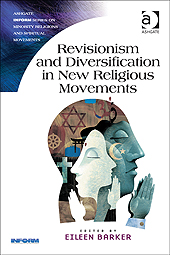Revisionism and Diversification in New Religious Movements

Revisionism and Diversification in New Religious Movements
Eileen Barker, ed.
Ashgate Inform Series on Minority Religions and Spiritual Movements 2013
New Religious Movements tend to start their lives with a number of unequivocal statements, not only of a theological nature but also about the world and appropriate behaviours for the believer. Yet these apparently inalienable Truths and their interpretations frequently become revised, ‘adjusted’ or selectively adopted by different believers.
This book explores different ways in which, as NRMs develop, stagnate, fade away, or abruptly cease to exist, certain orthodoxies and practices have, for one reason or another, been dropped or radically altered. Sometimes such changes are adapted by only a section of the movement, resulting in schism. Of particular concern are processes that might lead to violent and/or anti-social behaviour. As part of the Ashgate/Inform series, and in the spirit of the Inform Seminars, this book approaches its topic from a wide range of perspectives. Contributors include academics, current and former members of NRMs, and members of ‘cult-watching’ movements. All the contributions are of a scholarly rather than a polemic nature, and brought together by Eileen Barker, the founder of Inform.
Contents: Revision and diversification in new religious movements: an introduction, Eileen Barker; The family international: rebooting for the future, Clare Borowik; The changing faces of God: the Hinduisation of the Hare Krishna Movement, E. Burke Rochford Jr; The post-Sun Myung Moon Unification Church, Michael L. Mickler; The Church of Scientology, Hugh B. Urban; La Mission de l’Esprit-Saint: 100 years of prophecies and schisms in a Quebecois NRM, Susan J. Palmer; The Orthodox Church of the Sovereign Mother of God/the New Cathar Church, J. Eugene Clay; Appendix: Blessed Father John: additional information supplied by the Church; Present truth and theological revisionism among the Branch Davidians, Eugene V. Gallagher; Aum Shinrikyo and Hikari no Wa, Erica Baffelli; The re-invented wheel: doctrinal revisions and control of the Falungong, 1992-2012, James W. Tong; Change and continuity: Hizb ut Tahrir’s strategy and ideology in Britain, Shiraz Maher; The metamorphosis of MEK (Mujahedin e Khalegh), Masoud Banisadr; When history fails: Mormon origins and historical revisionism, Massimo Introvigne; Revisionism in the New Age Movement: the case of healing with crystals, J. Gordon Melton; Intentional communities: the evolution of enacted Utopianism, Timothy Miller; Changes in North American cult awareness organizations, Carol Giambalvo, Michael Kropveld and Michael Langone; Changing vision, changing course: en-visioning/re-visioning and concentration/diversification in NRMs, David G. Bromley; Index.
About the Editor: Eileen Barker, PhD, OBE, FBA, is Professor Emeritus of Sociology with Special Reference to the Study of Religion at the London School of Economics, University of London. Her main research interests are ‘cults’, ‘sects’ and new religious movements, and the social reactions to which they give rise. She has over 300 publications (translated into 27 different languages), which include the award-winning The Making of a Moonie: Brainwashing or Choice? and New Religious Movements: A Practical Introduction. In 1988, with the support of the British Government and mainstream Churches, she founded INFORM, a charity that provides information about minority religions that is as reliable as possible. She is a frequent advisor to governments, other official bodies and law-enforcement agencies throughout the world, has made numerous appearances on television and radio, and has been invited to give guest lectures in over 50 countries.
Reviews: ‘This is an impressive collection by major scholars of new religions who address major changes that have occurred in some of the most interesting and controversial of the new religious movements. It is packed with up to date information that will be of interest to scholars of many disciplines including sociology, religious studies, and the history of religions.’ — James T. Richardson, University of Nevada, USA